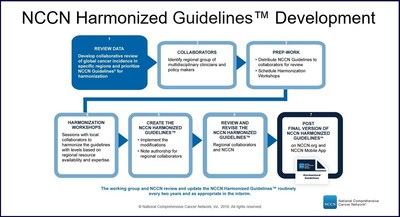International Collaboration to Improve Cancer Care in Sub-Saharan Africa Announces Management of Most Adult Cancers Covered by NCCN Harmonized Guidelines

National Comprehensive Cancer Network,African Cancer Coalition,and American Cancer Society launch new phase focused on updating adult cancer guidelines and adding new guidelines for treating children with cancer.
NCCN Harmonized Guidelines™ for Sub-Saharan Africa endorsed in six countries representing nearly half the region's population.
ADDIS ABABA,Ethiopia and PLYMOUTH MEETING,Pennsylvania,Aug. 28,2019 -- A collaborative project from the National Comprehensive Cancer Network® (NCCN®),the African Cancer Coalition (ACC),the American Cancer Society (ACS),and others to improve cancer outcomes in Sub-Saharan Africa enters a new phase in Addis Ababa,Ethiopia,today. Oncologists from 11 African countries—along with the CEOs of ACS and NCCN—are attending a meeting hosted by the Ethiopian Health Minister. Attendees will help finalize additional NCCN Harmonized Guidelines™ for Sub-Saharan Africa,bringing the total to 42 guidelines providing best practice cancer treatment recommendations for more than 86% of all adult cancer incidence in the region according to ACS.

NCCN Harmonized Guidelines Development
There are an estimated 811,000 new cases of cancer and 527,000 deaths from cancer each year in Sub-Saharan Africa1 and incidence is expected to double by 2040 to more than 1.6 million cases annually due to population growth and aging2. Cancer care in Africa is characterized by late presentation,limited access to treatment,and poor outcomes relative to other geographical regions.
"Cancer can be twice as lethal in Sub-Saharan Africa as it is in the United States," said Robert W. Carlson,MD,CEO,NCCN. "By providing free online access to the latest research and analysis,we can help local medical providers save more lives. More than 7,000 copies of the NCCN Harmonized Guidelines for Sub-Saharan Africa have been downloaded from the NCCN website,and many more via our mobile app."
"The American Cancer Society is proud to be part of this critical step toward standardizing cancer care in Africa," said Gary Reedy,American Cancer Society. "The harmonization of 42 NCCN Guidelines is a tremendous accomplishment that would not have been possible without the collaboration of individuals and institutions committed to advancing cancer care in Africa."
The first NCCN Harmonized Guidelines™ for Sub-Saharan Africa debuted in November of 2017,during the biennial African Organisation for Research and Training in Cancer (AORTIC) conference in Kigali,Rwanda. In addition to covering various cancer types (such as breast,prostate,and cervical cancer),they also provide treatment recommendations for pain management,survivorship,smoking cessation,and other aspects of supportive care. The full list of current and upcoming guidelines can be found at NCCN.org/harmonized.
The medical recommendations have been officially endorsed in Ethiopia,Malawi,Nigeria,Tanzania,Uganda,and Zambia. Together,those countries are home to 43% of the population of Sub-Saharan Africa. With support from ACS,121 cancer experts from 34 institutions in Africa have attended Coalition meetings,as well as representatives from 7 health ministries and 19 experts from NCCN and its Member Institutions.
"As African governments and specialists mount a response to the growing cancer epidemic,they identified the need for cancer treatment guidelines that reflect the most up-to-date clinical knowledge and provide flexibility for use across resource levels,from state-of-the-art cancer centers to basic community hospitals," said Prof. Isaac F. Adewole,FAS,FRCOG,FSPSP,DSc,Immediate past Honorable Minister for Health,Nigeria. "Without these guidelines,it would not be possible to scale-up access to treatment to meet the needs of people with cancer."
NCCN Harmonized Guidelines™ use color-coding to represent both the optimal care that low- and mid-resource countries aspire to provide and pragmatic approaches that provide effective treatment options for resource-constrained settings. They are based on the NCCN Clinical Practice Guidelines in Oncology (NCCN Guidelines®),containing recommendations from interdisciplinary panels of experts from across the 28 leading academic cancer centers that comprise NCCN. NCCN Guidelines® are the recognized standard for clinical policy in cancer care and are the most thorough and frequently updated clinical practice guidelines available in any area of medicine. They cover most types of cancer,plus supportive care,prevention,and genetic screening.
NCCN began including recommendations for pediatric cancers in May 2019. The Sub-Saharan Africa harmonization of the NCCN Guidelines for Pediatric Acute Lymphoblastic Leukemia (ALL) is set to publish in early 2020. The organization is also continuing to increase worldwide resources for pediatric cancers with the future publication of NCCN Guidelines for Pediatric B-Cell Lymphomas (including Burkitt Lymphoma,which has higher prevalence in Africa),Pediatric Wilms Tumor,and Pediatric Hodgkin Lymphoma.
Learn more at NCCN.org/global,and join the conversation online with the hashtag #NCCNGlobal.
About the National Comprehensive Cancer Network
The National Comprehensive Cancer Network® (NCCN®) is a not-for-profit alliance of 28 leading cancer centers devoted to patient care,research,and education. NCCN is dedicated to improving and facilitating quality,effective,efficient,and accessible cancer care so patients can live better lives. Through the leadership and expertise of clinical professionals at NCCN Member Institutions,NCCN develops resources that present valuable information to the numerous stakeholders in the health care delivery system. By defining and advancing high-quality cancer care,NCCN promotes the importance of continuous quality improvement and recognizes the significance of creating clinical practice guidelines appropriate for use by patients,clinicians,and other health care decision-makers around the world.
Clinicians,visit NCCN.org. Patients and caregivers,visit NCCN.org/patients. Media,visit NCCN.org/news. Follow NCCN on Twitter @NCCN,Facebook @NCCNorg,and Instagram @NCCNorg.
1Ferlay J,Ervik M,Lam F,Colombet M,Mery L,Piñeros M,Znaor A,Soerjomataram I,Bray F (2018). Global Cancer Observatory: Cancer Today. Lyon,France: International Agency for Research on Cancer. Available from: https://gco.iarc.fr/today,accessed 15 August 2019.
2Ferlay J,Bray F (2018). Global Cancer Observatory: Cancer Tomorrow. Lyon,France: International Agency for Research on Cancer. Available from: https://gco.iarc.fr/tomorrow,accessed 15 August 2019.
Media Contact:
Rachel Darwin
267-622-6624
darwin@nccn.org
Photo - http://cusmail.com/res/2023/07-22/18/5e37d51a7c2dacacd041c1afe2820776.jpg
Logo - http://cusmail.com/res/2023/07-22/18/b135631d41df0445a7501dfc57dab47e.jpg